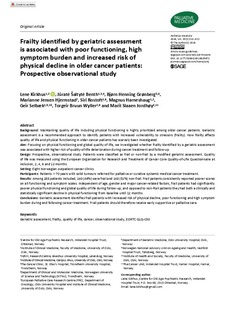| dc.contributor.author | Kirkhus, Lene | |
| dc.contributor.author | Saltyte Benth, Jurate | |
| dc.contributor.author | Grønberg, Bjørn Henning | |
| dc.contributor.author | Hjermstad, Marianne Jensen | |
| dc.contributor.author | Rostoft, Siri | |
| dc.contributor.author | Harneshaug, Magnus | |
| dc.contributor.author | Selbæk, Geir | |
| dc.contributor.author | Wyller, Torgeir Bruun | |
| dc.contributor.author | Jordhøy, Marit Slaaen | |
| dc.date.accessioned | 2019-12-27T07:54:35Z | |
| dc.date.available | 2019-12-27T07:54:35Z | |
| dc.date.created | 2019-02-06T15:02:33Z | |
| dc.date.issued | 2019 | |
| dc.identifier.citation | Palliative Medicine. 2019, 33 (3), 312-322. | nb_NO |
| dc.identifier.issn | 0269-2163 | |
| dc.identifier.uri | http://hdl.handle.net/11250/2634418 | |
| dc.description.abstract | Background:
Maintaining quality of life including physical functioning is highly prioritized among older cancer patients. Geriatric assessment is a recommended approach to identify patients with increased vulnerability to stressors (frailty). How frailty affects quality of life and physical functioning in older cancer patients has scarcely been investigated.
Aim:
Focusing on physical functioning and global quality of life, we investigated whether frailty identified by a geriatric assessment was associated with higher risk of quality-of-life deterioration during cancer treatment and follow-up.
Design:
Prospective, observational study. Patients were classified as frail or non-frail by a modified geriatric assessment. Quality of life was measured using the European Organization for Research and Treatment of Cancer Core Quality-of-Life Questionnaire at inclusion, 2, 4, 6 and 12 months.
Setting:
Eight Norwegian outpatient cancer clinics.
Participants:
Patients ⩾70 years with solid tumours referred for palliative or curative systemic medical cancer treatment.
Results:
Among 288 patients included, 140 (49%) were frail and 148 (51%) non-frail. Frail patients consistently reported poorer scores on all functioning and symptom scales. Independent of age, gender and major cancer-related factors, frail patients had significantly poorer physical functioning and global quality of life during follow-up, and opposed to non-frail patients they had both a clinically and statistically significant decline in physical functioning from baseline until 12 months.
Conclusions:
Geriatric assessment identifies frail patients with increased risk of physical decline, poor functioning and high symptom burden during and following cancer treatment. Frail patients should therefore receive early supportive or palliative care. | nb_NO |
| dc.language.iso | eng | nb_NO |
| dc.publisher | Sage Publications | nb_NO |
| dc.rights | Navngivelse-Ikkekommersiell 4.0 Internasjonal | * |
| dc.rights.uri | http://creativecommons.org/licenses/by-nc/4.0/deed.no | * |
| dc.title | Frailty identified by geriatric assessment is associated with poor functioning, high symptom burden and increased risk of physical decline in older cancer patients: Prospective observational study | nb_NO |
| dc.type | Journal article | nb_NO |
| dc.type | Peer reviewed | nb_NO |
| dc.description.version | publishedVersion | nb_NO |
| dc.source.pagenumber | 312-322 | nb_NO |
| dc.source.volume | 33 | nb_NO |
| dc.source.journal | Palliative Medicine | nb_NO |
| dc.source.issue | 3 | nb_NO |
| dc.identifier.doi | 10.1177/0269216319825972 | |
| dc.identifier.cristin | 1674133 | |
| dc.description.localcode | Open Access CC-BY-NC | nb_NO |
| cristin.unitcode | 194,65,15,0 | |
| cristin.unitcode | 1920,12,0,0 | |
| cristin.unitname | Institutt for klinisk og molekylær medisin | |
| cristin.unitname | Kreftklinikken | |
| cristin.ispublished | true | |
| cristin.fulltext | postprint | |
| cristin.qualitycode | 1 | |

